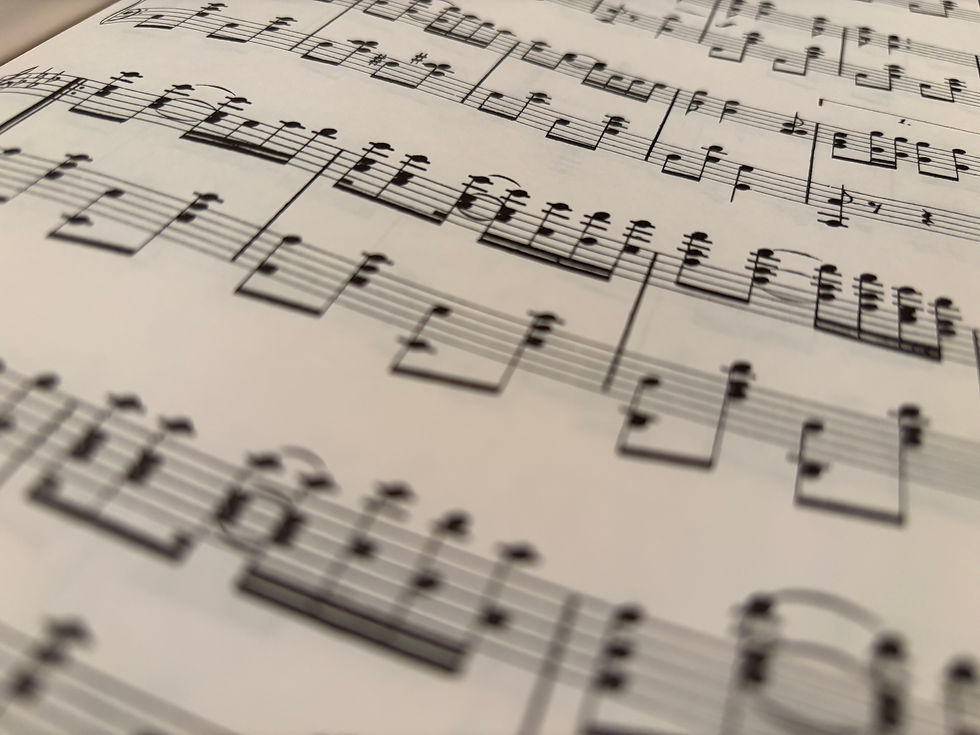Month 2: Sleep
- Leenie Wilcox

- May 18, 2025
- 4 min read
As a child, I slept like the dead — anywhere would do. The floor, the car, a tree crevice. Why not? Sleep was a faithful companion eager to sweep me away.
Now, it's a fickle lover playing hard to get (and my long record of singleness can testify to my success in winning over such fickle lovers). Moonlight blinds me, silence screams with tinnitus, and my bladder has the capacity of a shot glass.
My nightly routine has evolved from simply closing my eyes to strapping myself in like I'm preparing for NASA's zero-gravity toilet training. Sleep mask obscuring vision? Check. Mouth sealed shut with medical tape? Absolutely. Knees weighed down by ice packs? Naturally. Sometimes I even don my headphones to listen to books that walk the tightrope between "mildly interesting" and "could cure insomnia." I essentially enter witness protection from consciousness every night.
I remain militantly dedicated to eight hours of sleep. Those who've encountered me after a six-hour night would testify under oath that this isn't vanity — it's public safety.
Taping
I don't think I snore, but it's remarkably difficult to self-diagnose behaviors while unconscious. After reading James Nestor's "Breath," I discovered that taping one's mouth shut at night isn't just for kidnapping victims — it's for respiratory optimization [1].
My primary sleep complaint is waking up for bathroom trips with the reliability of a German train schedule. While "don't drink water" seems obvious, breathing might actually be the culprit in this midnight bladder conspiracy.
Here's the vicious cycle my body delights in:
Mouth breathing causes you to lose 40% more water than nose breathing [2]. This dehydration triggers a cascade of physiological nightmares including a parched throat that feels like you've been gargling sand and the body temperature regulation of a malfunctioning thermostat [3]. These discomforts fragment your sleep — creating brief awakenings that interrupt normal sleep cycles [4]. Some are so brief (3-15 seconds) you don't even remember them, which is an obnoxious way for my body to gaslight my conscious about my sleep quality [5].
This disruption wreaks havoc with the antidiuretic hormone (ADH) cycle, which should be high at night to prevent your bladder from staging a midnight coup. When ADH levels stay low, your body produces urine with the enthusiasm of a beer festival attendee [6]. But once a spec of dust infiltrates the microchip, each bathroom trip accelerates dehydration, completing the circle of sleep hell.
Slapping tape across my mouth — a solution that sounds like it was conceived by a sleep-deprived serial killer — has miraculously improved my sleep quality and reduced my nocturnal bathroom pilgrimages [7].
Ice Packs
After increasing my exercise regimen, my knees began sending threatening messages about potential pain. I started icing them post-workout and discovered, to my surprise, that ice packs in bed are like having a personal air conditioner. I can cocoon in blankets without melting like human fondue.
The science checks out: cooler temperatures lower heart rate variability ratios, boosting parasympathetic activity that promotes relaxation and better sleep [8]. Sometimes the oldest tricks work best — just like how threatening your body with hypothermia can make it behave.
Conclusion
So here I am, mouth forcibly shut, body parts strategically refrigerated, sleeping like a captive science experiment. Is this what adulthood promised us? Perhaps not, but neither were taxes or back pain, and at least this bizarre ritual delivers results.
If you find me hibernating in this contraption, please don't wake me unless the house is on fire —and even then, consider whether the flames are moving fast enough to outdo my ice packs. Good sleep isn't just precious; it's my version of performance art, complete with props, elaborate setup, and (since E.T. moved out from under my bed when I was eight) an audience of exactly zero. Sweet dreams, indeed.
References
[1] Nestor, J. (2020). Breath: The new science of a lost art. Riverhead Books.
[2] Svensson, S., Olin, A. C., & Hellgren, J. (2006). Increased net water loss by oral compared to nasal expiration in healthy subjects. Rhinology, 44, 74-77.
[3] Svensson, S., & Bell, V. (2022). Breathing through your mouth is dehydrating: You lose 42% more water this way. Verity Yoga, Gait & Breath. Retrieved from https://veritybell.co/breathing-through-your-mouth-is-dehydrating-you-lose-42-more-water-this-way/
[4] Noh, J. Y., Han, D. H., Yoon, J. A., Kim, M. H., Kim, S. E., Ko, I. G., Kim, K. H., Kim, C. J., & Cho, S. (2011). Circadian rhythms in urinary functions: Possible roles of circadian clocks? International Neurourology Journal, 15(2), 64-73.
[5] Age-Related Sleep Disruption and Reduction in the Circadian Rhythm of Urine Output: Contribution to Nocturia? (2016). Current Aging Science, 9(1), 34-43.
[6] Healthline. (2023). What to Know About Antidiuretic Hormone (ADH). Retrieved from https://www.healthline.com/health/antidiuretic-hormone
[7] Howes, L. (2021). The truth about breathing & why you're doing it wrong with James Nestor. The School of Greatness. Retrieved from https://lewishowes.com/podcast/the-truth-about-breathing-why-youre-doing-it-wrong-with-james-nestor/
[8] Togo, F., Watanabe, E., Park, H., Shephard, R. J., & Aoyagi, Y. (2010). Meteorology and the physical activity of the elderly: The Nakanojo Study. International Journal of Biometeorology, 54(1), 83-89.



Comments